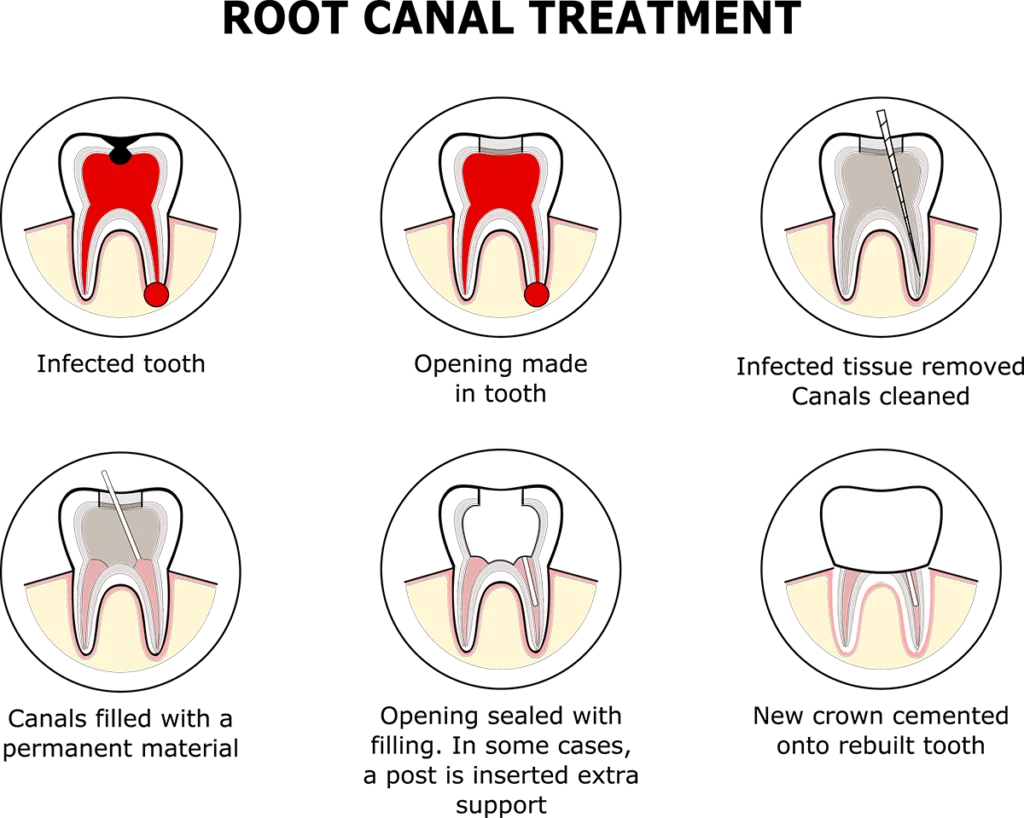Root canal therapy can be a necessary procedure to save a seriously damaged or infected tooth. While some instances of infected teeth may not cause overt symptoms, many others can cause intense pain and even serious risks to your overall health. Whether you are experiencing symptoms or not, an infected tooth will only get worse, and root canal therapy can be very effective at reinforcing the damaged tooth and preventing the chance that it will fall out or cause further harm. Our experienced dentist in La Mesa, Dr. Jimmy Wu, can evaluate your needs and develop a customized root canal treatment plan designed to restore your dental health.
- What is a Root Canal?
- How Do I Know If I Need a Root Canal?
- Consequences of Avoiding a Root Canal
- Root Canal Procedure
- How Long Does a Root Canal Take?
- Root Canal Pain
- Root Canal Recovery
- Root Canal Cost
- Root Canal Alternatives
- Root Canal Risks
- Prevent the Need for a Root Canal
What is a Root Canal?
A root canal is a procedure designed to renew the health of a tooth that is suffering from an infection. Cracks, deep cavities, and severe decay can cause a tooth’s structure to be compromised, which can then lead to a buildup of bacteria that infects the tooth’s pulp and nerve chamber. These areas are filled with nerves and blood vessels, and an untreated infection can cause severe symptoms and potentially lead to the loss of the tooth. Even more seriously, this infection could dramatically increase the risks to an individual’s overall health, possibly leading to life-threatening conditions such as heart attack, stroke, and others. Root canal therapy with the addition of a custom crown can treat the infection, relieve symptoms, and save the tooth from extraction by restoring its health and reinforcing its structure.
How Do I Know If I Need a Root Canal?
It’s important to remember that, in some cases, patients who have an infected tooth and are in need of a root canal may not suffer from any overt symptoms. This makes it even more vital that individuals regularly visit the dentist for routine exams and cleanings at least twice each year. In other cases, there can be very prominent and noticeable symptoms that typically necessitate immediate examination by a dentist to determine whether root canal therapy will be required. These symptoms include:
- A toothache that can be mild, moderate, or one that causes severe and intense pain
- A tooth that is sensitive to hot and cold temperatures
- The formation of an abscess around the tooth. An abscess can appear as a growth or lump in the tissues surrounding the tooth; however, sometimes an abscess that has developed may not be noticeable.
- Trouble chewing
- A tooth that appears discolored or dark
- Tenderness, swelling, and/or inflammation of the gums
- A discharge from the gums
- A bad taste in the mouth
- A throbbing, pressure sensation in the area of the tooth
A dental examination can determine whether your tooth is infected and in need of root canal therapy. Individuals who suffer from symptoms such as those listed above should schedule an appointment as quickly as possible.
What Happens if You Don’t Get a Root Canal?
When the pulp inside the root canal becomes inflamed or infected, it is important for patients to receive root canal treatment. If the infection is left untreated, it can spread to the jawbone, gums, soft tissues of the face and neck, and beyond. Some patients may lose their infected tooth or even part of their jaw. Dental infections can also lead to other serious complications, including a dental abscess, heart attack, stroke, or sepsis. Root canal therapy can prevent the spread of infection, alleviate tooth pain, and save your smile. That is why it is usually in the best interest of the patient to go through with a root canal if their dentist recommends treatment.
How is a Root Canal Procedure Performed?
Root canal therapy typically begins with the application of a strong local anesthetic to the area surrounding the infected tooth to minimize the potential for discomfort during the procedure. The tooth’s nerve chamber will be thoroughly cleaned out and disinfected to eliminate bacteria. Then, the nerve chamber will be sealed to help protect it against future infection. Once this is accomplished, it is typically recommended that a customized dental crown be placed on the tooth as the final step. This precisely designed crown can provide the tooth with exceptional strength and support, in addition to enhancing its appearance and shielding it from further structural breakdown. The crown is color-tinted to match surrounding teeth so that it looks as natural as possible.

How Long Does a Root Canal Take?
Root canal therapy can often be accomplished in a single appointment; however, this will depend on each patient’s unique needs. If multiple teeth are being treated with root canal therapy, they will likely need to be treated in separate appointments. It may also be recommended that patients have their crown placed at a future appointment rather than immediately after the root canal. Ultimately, Dr. Wu will be able to give you a better idea of what to expect once you have been examined and the treatment plan is developed.
Is a Root Canal Painful?
It is normal for patients to feel nervous about getting a root canal; however, many patients find that their root canal experience is not as bad as they anticipated. The root canal process is not considered painful, in fact, treatment is designed to alleviate tooth pain that already exists. Patients report feeling much better after their root canal than they did before the appointment. Dentists may use anesthesia or sedation techniques to make the procedure more comfortable and as painless as possible. Patients may feel pressure and movement during the root canal treatment, but should not feel pain. Despite its unpleasant reputation, root canal therapy is actually a relatively quick procedure that can relieve tooth pain and preserve the natural tooth.
What is Recovery Like After a Root Canal?
While many patients are able to resume normal daily activities immediately after root canal therapy, it is important to note that it can take a couple of hours for the effects of the local anesthetic to wear off. This means that the mouth will still feel numb for a brief period after treatment. Some degree of tenderness in the area can be expected for a few days, and patients should refrain from using the treated tooth to chew until the tenderness has faded. Discomfort following root canal therapy can typically be well-managed with over-the-counter pain medication. If swelling, soreness, an uneven bite, or other effects persist longer than a few days following root canal treatment, patients are advised to call our practice.
How Much Does a Root Canal Cost?
Root canals typically start at about $900 at our practice; however, the total price of root canal therapy is highly variable among patients since the treatment is customized for each individual’s needs. A number of different factors will be taken into account, including the severity of the infection, the extent and complexity of the dental work that will be required to address the condition, whether the tooth is located toward the front or the back of the mouth, the cost of the custom dental crown, and other associated expenses.
Once your treatment plan is created, a member of our team here at Sutra Dental Spa will go over the total cost estimate with you and answer any questions you may have. Many dental insurance plans offer some level of coverage for root canal therapy, and our practice also accepts a range of convenient payment methods. These include dental financing through CareCredit®, which offers an array of options that can help qualified applicants pay for their treatment on a monthly basis.
Are There Any Alternatives to Getting a Root Canal?
The main goal of a root canal is to restore an infected tooth without having to extract or remove it. In some cases, the infection may be so severe that a tooth extraction is necessary. Both root canal therapy and extraction are designed to relieve dental pain, but it is typically more optimal to save the tooth if possible. Tooth extraction can serve as an alternative to a root canal but may cause more discomfort, have a longer recovery time, and require more follow-up visits after treatment. Dr. Wu can go over your options during the consultation and help you determine if a root canal is the best solution for your needs.
Are There Any Risks Associated with Root Canal Therapy?
Like any other dental procedure, there are some risks associated with root canal therapy. On very rare occasions, the possible complications that may arise after treatment are:
- Recurrence of infection if bacteria in the tooth was not entirely removed
- The crown on the tooth loosens or gets worn down
- Undetected cracks in the tooth root or canal branches start to cause pain
The team at Sutra Dental Spa prides itself on working with experienced professionals who use advanced techniques and the latest technology for root canal procedures so that the risk of complications can be reduced. It is highly important for patients to keep their gums and teeth as healthy as possible to minimize the risk of dental problems in the future.
How Do I Prevent the Need for Root Canal Treatment?
Prevention is one of the best ways to avoid the need for a root canal. To help prevent dental issues, we recommend patients do the following:
- Brush teeth at least twice a day
- Floss at least once a day
- Have regular checkups and bi-annual cleanings with the dentist
- Refrain from eating sticky, sugary, and hard foods that can make the teeth vulnerable to bacteria
- Avoid sugary or acidic drinks that can break down the enamel and cause bacteria to accumulate
- Wear a mouthguard when playing sports to avoid dental traumas
- Use fluoride toothpaste and mouthwash that can prevent tooth decay and cavities
- Visit a dentist as soon as moderate to severe pain is felt in the gums or teeth
Overall, by maintaining good oral hygiene, many people can avoid getting a root canal in their lifetime.
To learn more about root canal treatment or other advanced dental procedures at our practice, or to schedule a consultation, please contact us today.




 Before
Before
 After
After